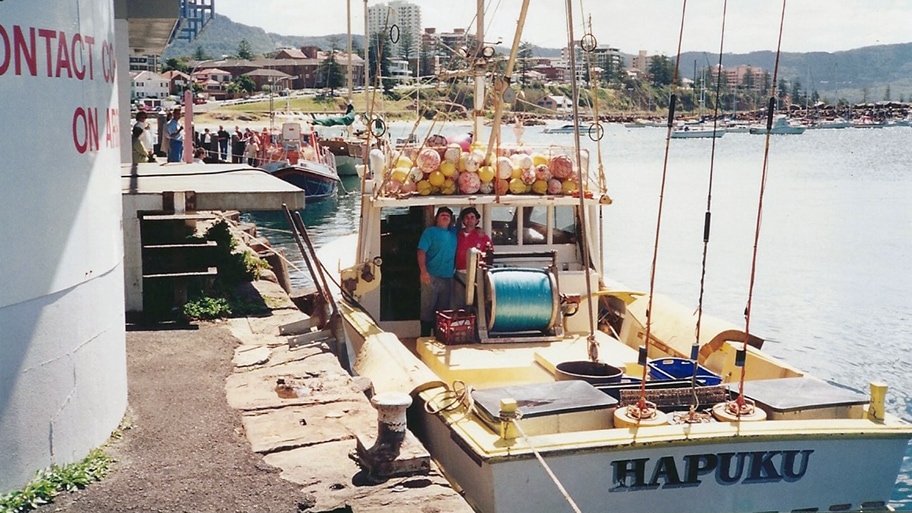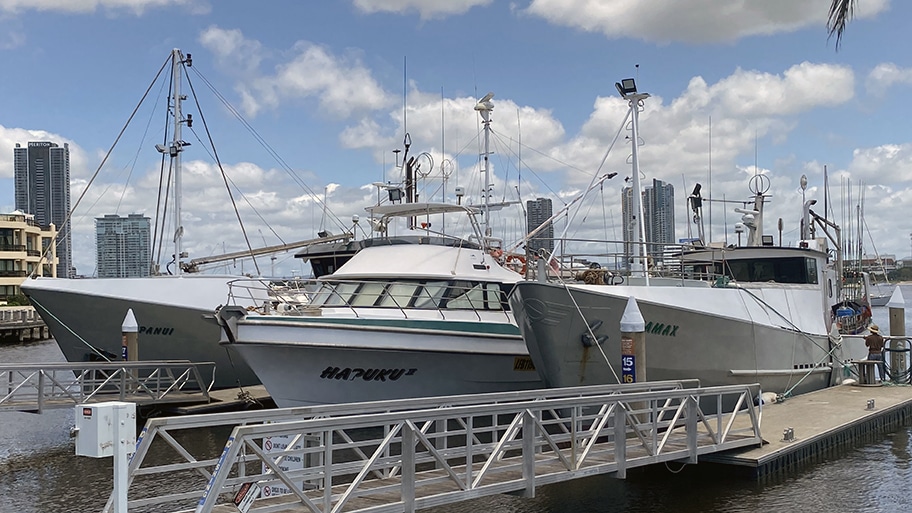Talking tuna with Lisa Jacobsen of Prime Fish Australia
To celebrate Tuna Australia gaining MSC certification for the Australian Eastern Tuna & Billfish Fishery, Sally Bolton from the Marine Stewardship Council spoke with Lisa Jacobsen of Prime Fish Australia, a Tuna Australia member and MSC Chain of Custody holder. The conversation covered how the business has evolved, dealing with the challenges of COVID-19, what MSC certification means for them, and what Aussie seafood lovers need to know about how the fish they love is caught and handled.
How does your business operate?
We are a commercial fishing business that owns and operates three tuna longline vessels based in Southport, Gold Coast. We have an export and distribution facility in Burleigh Heads, also on the Gold Coast.
Our story starts with Hapuku Fisheries, which was founded in 1988 by Vince Pavia in the seaside town of Wollongong, approximately 100 km south of Sydney, Australia. Originally a motor mechanic, Vince convinced his Dad and brother to take a huge risk and purchase a 38-foot longline vessel called the Hapuku. Vince’s 87-year-old grandfather initially skippered the boat and imparted his years of fishing knowledge.
In the early 1990s, Jeramy Jacobsen (who is now the general manager across all operations) was employed as a deckhand and it was from these humble beginnings that this family business began to grow to what it is today.

Vince Pavia and Jeramy Jacobsen on the first boat ‘Hapuku’ in the port of Wollongong © Prime Fish Australia
Having first-hand knowledge of the fishing process allows our team to fully understand and appreciate the best way to handle our fish to obtain superior quality to satisfy the demands of our domestic and international markets.
We now manage the whole process from the ocean to the consumer and this gives us control over the supply chain. In 2011, we acquired Prime Fish Australia in Mooloolaba and four years ago we bought a building on the Gold Coast, and purpose-built our facility here. We designed and built it exactly to our needs for the fishing business. It’s fantastic. We’ve got this great facility, our own truck and we’re now self-sufficient. That was the goal of it all. Just over 30 people work for the business at the moment.
What’s your role in the business?
Pretty much everything! I’m a general manager, so I oversee the operations from production to quality assurance, marketing, human resources, packing the fish, some accounting, and strategic planning. I’ve been involved in the business for more than 20 years.
Over the period that you’ve been involved, what have been the most significant changes you’ve seen in the industry?
The change in demand for our main catch, which is sashimi-grade tuna. We used to export the bulk of our product to Japan.
In the last few years, we’ve seen a shift where the demand is a lot higher in the US. A lot of our product goes to the US now versus Japan and that’s been a significant change.
People are eating more sashimi-grade tuna at home. Before, it was more of a luxury item, only at fine dining restaurants, very much a Japanese cuisine. Now, you’re finding it in a lot more restaurants that wouldn’t necessarily showcase sashimi tuna before. It is getting more well known, but it is still quite a niche market for our product.
Increased costs are another major change. We used to import our squid bait from Argentina and a few other places. The cost of that bait has increased significantly over the last six years, largely because China is buying a lot of that squid for food product. We have adapted our fishing practices to catch our own bait now, which has been a massive shift. We had to redesign our boats and change how we fished, which ultimately has worked for us. We’re more self-sufficient now that we catch our own bait.
What will MSC certification mean for your business?
We’re hoping it will open up some new markets internationally for us. We’ve been waiting for the certification to see where we can go from here, slowly. This will definitely help us.
We’re also looking at our direct to public sales, and opening up a shop front. I think that’s where we’re going to find the real benefits of the MSC certification, being able to showcase our fish as sustainable. It is a very niche market.
The way we catch the fish and the way we sell it is as a very fresh product: it comes in and we get it to your door. We find that a lot of our direct customers are people who will have a dinner party and talk about how they’ve bought their fish direct off our boats. Because we do the whole process, we can talk about where it was caught and how it’s been handled. Adding the MSC sustainability certification to that is going to add to the conversation that people are having about our product.
What was the process of being assessed to the MSC Standard like from your side?
To be honest, on the fishery side, it was fabulous! Tuna Australia took care of it all, and it was no pain whatsoever for us.
As for the audit process for the chain of custody certification, it was quite easy. We’re an export establishment, so we already go through rigorous audits and have a lot of procedures in place. Having to go through the CoC audit wasn’t daunting. We’ve got to change a few little ways that we do things and a few procedures, but again, it was very straightforward. It has added some more paperwork, of course, like everything does, but I think we’re really going to get the benefits from it.

Prime Fish owns and operates three tuna longline vessels based in Southport, on the Gold Coast © Prime Fish Australia
What have been the biggest challenges that you’ve had to deal with during the current COVID-19 pandemic?
Mainly it came down to international flights because the majority of our product is exported. All of a sudden, we had no way of getting it there. We’ve adapted. We have got some flights that are going out on a weekly basis, and we’ve had to adapt our fishing practices to try and meet those flights. Whereas in the past, we could come in and unload and send out fish any day of the week. Now when my boat comes in, I’ve got to get it packed and on a plane so it can be in the US or Japan while it’s fresh.
The cost of freight has increased significantly. The government’s International Freight Assistance Mechanism has helped by bringing in subsidies and flight schedules for international freight in our sector, for agriculture and seafood. That has helped lessen the impact, but it’s still double and triple the price of what we were paying pre-COVID.
And then, of course, we’re dealing with the worldwide markets and what’s happening over there as far as COVID goes. For example, Japan seemed to be doing great and demand was still there. Then all of a sudden they shut down, their restaurants were closed, their businesses slowed down. They’re the issues that we’re having to deal with, and it changes on a daily basis.
What’s one thing you wish people who loved Australian tuna and swordfish knew about the care and effort which goes into catching it and supplying it?
We treat our fish like babies. Our tuna weighs between 30 and 70 kilos each, so they’re big babies! Our fish come out of the cleanest waters in the world and our fishery is one of the best managed. We pride ourselves on our fishing practices, which allow us to get our product to either a customer on the Gold Coast or a restaurant in Tokyo, LA or New York while it’s fresh, and they can now be assured that it’s not only top-grade sashimi tuna but is also from a sustainable source.
We [Prime Fish] do shorter trips of around five days so our product is super fresh and retains it’s higher value – that’s our point of difference in the industry. Our freshness and the speed at which we can bring fish in and get it to the plate is quite a feat that the general public don’t realise. However, our customers know they can see and taste the difference when their fish is super-fresh. Our fish is as fresh as you can get unless you catch it yourself!
What’s your favourite way to enjoy your product?
Sashimi tuna with wasabi and soy sauce. That’s it. Nice and simple. Can’t go wrong. It’s my favourite. Sometimes just straight out of the fish. It’s so good. If I’m going to cook it, I like swordfish on the barbecue.
This article first appeared on the Marine Stewardship Council website and this shorter version (edited for brevity) has been republished here with MSC permission.